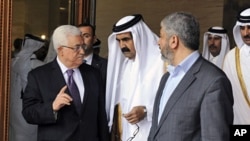Two rival Palestinian organizations, Hamas and Fatah, agreed on a power-sharing accord earlier this month. Experts say the new agreement is another step forward in healing the rift between the two organizations, whose territories are separated by Israel.
The secular Fatah movement is led by Mahmoud Abbas, also president of the Palestinian Authority, and rules the West Bank. He has been in power since January 2005, succeeding the late Yasser Arafat, founder of the Fatah movement.
The militant group Hamas is also known as the Islamic Resistance Movement and is the elected ruling party in the Gaza Strip.
|
Fatah-Hamas Ties Since 2007 |
|
For years, Hamas has carried out suicide bombings and rocket attacks against Israel, prompting inevitable Israeli military responses. An unofficial cease-fire between Hamas and Israel has been in effect since last April. The United States and Israel consider Hamas to be a terrorist group, though Hamas also runs an extensive social service network.
After months of talks, the two groups agreed that Mr. Abbas will lead a unity government that will prepare for new presidential and parliamentary elections later this year. The agreement was signed in Doha, the capital of Qatar. Experts say this fulfills a key requirement of a previous accord brokered by the Egyptians last May.
Fawaz Gerges, a Middle East expert at the London School of Economics, welcomes the power-sharing agreement. But he adds a cautionary note.
“The jury is still out on whether Fatah and Hamas can put their differences aside and begin the process of reconciliation, of governing," he said. "And even though the accord talks about reconciliation, how do you empower Fatah in Gaza where Hamas rules supreme? Will Mahmoud Abbas be able to govern Gaza? Will Hamas cease its authority in Gaza? And also, you have dissenting voices within Hamas and also within Fatah. So although the accord represents a breakthrough, at least symbolically and politically, the reality is the devil is in the details.”
Gerges says this is not the first time that the two Palestinian factions promised to put their differences aside.
“The difference between previous agreements and the Qatar accord is that so many changes have taken place in Palestine and the region itself. I would argue that the Arab Spring awakenings have had a major impact on the Hamas leadership," said Gerges. "The Hamas leadership no longer feels besieged as it used to be before the rise of the Islamists took power in Tunisia, in Morocco, in Egypt. Hamas feels now that it has strategic depth, that Egypt no longer is hostile, as it used to be under Mubarak.”
Key Players in Hamas and Fatah:
Many experts, including Alon Ben-Meir, a Middle East expert at New York University, say Hamas is changing and is moving away from violence.
“They have also been advised by the Muslim Brotherhood in Egypt and specifically, recently by King Abdullah of Jordan and certainly the Emir of Qatar, that if they do not abandon violence, that is going to be the end of the so-called ‘Palestinian enterprise’ - because Israel, at this juncture, at this specific time, is not going to tolerate any provocation coming from the West Bank and/or Gaza," said Ben-Meir. "And I think they know this only too well.”
Ben-Meir also says Fatah has every reason to urge Hamas to renounce violence.
“If you went to Ramallah or Jenin and other cities in the West Bank, you’ll be shocked to see the progress that they have made in terms of infrastructure, building roads, highways, restaurants and all that - they do not want to lose that, Ben-Meir said. "So I cannot imagine they [Fatah] making an agreement with Hamas that will reignite, or restart violence against the Israelis. That simply would not work.”
But John Bolton, former U.S. Ambassador to the United Nations, does not see Hamas changing.
“They know what they need to do to change: recognize the state of Israel, accept the previous agreements and renounce terrorism. And at least so far, they’ve done none of those things,” Bolton said.
Some experts believe the growing unity between Fatah and Hamas could signal a turning point in the search for a lasting peace in the Middle East - but only if violence is eradicated for good.
| Join the conversation on our social journalism site - Middle East Voices. Follow our Middle East reports on Twitter and discuss them on our Facebook page. |




